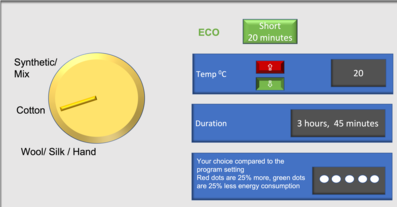
To reduce energy consumption of households, many appliances contain eco-settings, which when used, reduce energy consumption. However, the effectivity of the eco-settings in reducing energy consumption is hardly tested. Other design for sustainable behaviour strategies like coercion and feedback might be more effective. To test the effectivity of these three design for sustainable behaviour strategies in reducing the energy consumption of washing machines a total of 779 European washing machine users were asked to set washing machine controls for three laundry baskets on one of four different designed panels. The results showed that eco-settings of the washing machines were used for only 15% of the laundry cycles which resulted in minimal energy savings. Respondents presented with coercion or feedback controls consumed 15% less energy compared to those who were allowed to decide whether to use the eco-buttons or not.
Fortunately just after publication of the article the legislation in Europe was changed to at least making the eco-setting the default so if you forget to set it at least less energy is consumed.

Comments by our Users
Be the first to write a comment for this item.